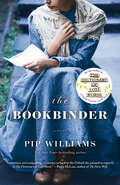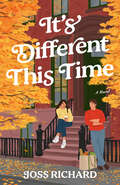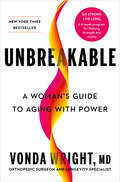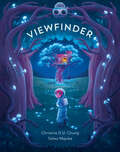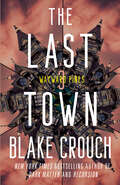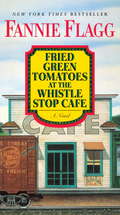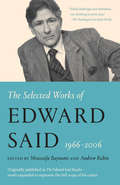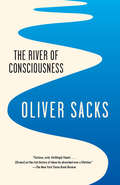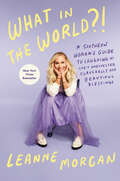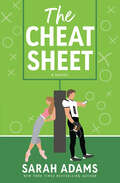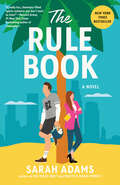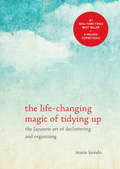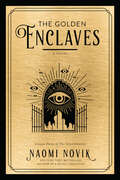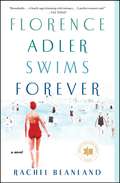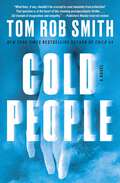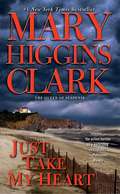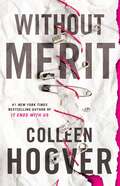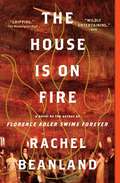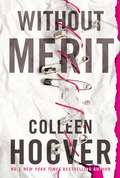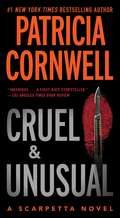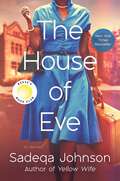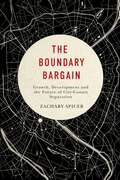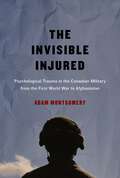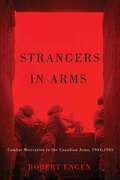- Table View
- List View
The Bookbinder: A Novel
by Pip WilliamsA young British woman working in a book bindery gets a chance to pursue knowledge and love when World War I upends her life in this new novel from the New York Times bestselling author of the Reese&’s Book Club pick The Dictionary of Lost Words.&“Williams spins an immersive and compelling tale, sweeping us back to the Oxford she painted so expertly in The Dictionary of Lost Words.&”—Paula McLain, author of The Paris WifeIt is 1914, and as the war draws the young men of Britain away to fight, women must keep the nation running. Two of those women are Peggy and Maude, twin sisters who live on a narrow boat in Oxford and work in the bindery at the university press.Ambitious, intelligent Peggy has been told for most of her life that her job is to bind the books, not read them—but as she folds and gathers pages, her mind wanders to the opposite side of Walton Street, where the female students of Oxford&’s Somerville College have a whole library at their fingertips. Maude, meanwhile, wants nothing more than what she has: to spend her days folding the pages of books in the company of the other bindery girls. She is extraordinary but vulnerable, and Peggy feels compelled to watch over her.Then refugees arrive from the war-torn cities of Belgium, sending ripples through the Oxford community and the sisters&’ lives. Peggy begins to see the possibility of another future where she can educate herself and use her intellect, not just her hands. But as war and illness reshape her world, her love for a Belgian soldier—and the responsibility that comes with it—threaten to hold her back. The Bookbinder is a story about knowledge—who creates it, who can access it, and what truths get lost in the process. Much as she did in the international bestseller The Dictionary of Lost Words, Pip Williams thoughtfully explores another rarely seen slice of history through women&’s eyes.
It's Different This Time: A Novel
by Joss RichardNATIONAL BESTSELLER • In this sweeping, second-chance romance, a twist of fate forces two former roommates back into their beloved New York City brownstone where they must confront the events that led to their estrangement—and the unresolved feelings lingering between them.Reeling from the cancellation of her hit TV show, June Wood has nothing left to lose when a mysterious email lures her back to the New York City brownstone she once called home before she moved to Los Angeles. Thanks to a clause in the former owner&’s will, she and her old roommate, Adam Harper, now own the multimillion-dollar property—or at least they will in a month, once all the paperwork is signed.Four weeks, then June can return to her life in LA and forget about New York City and everything she left behind. Sure, the fact that June and Adam are estranged and haven&’t even spoken in five years, and that their friendship didn&’t exactly end on good terms might complicate matters, but this is an opportunity of a lifetime.As the autumn leaves fall around them, through shared meals and late-night conversations, old wounds and long-buried sparks resurface, and it becomes strikingly clear: June and Adam have unfinished business. Confronted with the consequences of their choices years before, they must now navigate the minefield of their past the best way they know how: together. Second chances are always a risk, but maybe, if they get it right and are finally honest with each other and with themselves, it could be different this time.
Unbreakable: A Woman's Guide to Aging with Power
by Vonda Wright MDNEW YORK TIMES BESTSELLER • Stronger muscles and bones, increased mobility, lifelong independence, and a new mentality for aging with power—this cutting-edge guide to nutrition, training, and lifestyle will optimize a woman's body for longevity, through menopause and beyond.&“Stop believing the BS about getting older. In Unbreakable, Dr. Vonda Wright lays out the science that proves your best years can still be ahead.&”—Mel Robbins, #1 New York Times bestselling author of The Let Them Theory&“Building muscle and bone are what I like to call my nursing home avoidance plan. There is no better mentor in this important work than Dr. Vonda Wright.&”—Mary Claire Haver, MD, #1 New York Times bestselling author of The New MenopauseStrong skeletal muscle drives healthy longevity yet too often women in particular neglect this important measure of fitness. Indeed, more than 70% of women experience musculoskeletal symptoms like joint pain, muscle loss, and reduced bone density as they enter perimenopause and menopause. These symptoms—what Dr. Vonda Wright refers to as the "musculoskeletal syndrome of menopause"—can often set us up for osteoporosis, osteopenia, broken bones, increasingly limited mobility, and reduced independence later in life. That trend stops now. Unbreakable outlines a new and direct path to protecting ourselves against this too-common fate.Drawing on her decades of experience as a pioneering orthopedic surgeon helping women at all fitness levels to repair their bones and regain strength, Dr. Wright gives clear action steps to shield us from the timebombs of aging in four critical categories:Exercise: Pinpointing the right combination of cardio and resistance training for you to aid in tissue regeneration and improve metabolic function.Nutrition: What to eat to extinguish inflammation, repopulate your gut biome, and support strong bones and muscle growth.Lifestyle: How to manage chronic stress, get more restorative sleep, and turn down systemic inflammation in your daily life.Supplements: What to take to target the elimination of &“zombie cells&” and improve your cell function.Including a six-week, master exercise protocol to jumpstart skeletal and muscular strength, critical information about baseline blood and mobility tests that will help you understand your current health state, and twenty easy, anti-inflammatory recipes, Unbreakable is an invaluable guide to adding more vibrantly healthy life to your years.
Viewfinder
by Christine D.U. Chung Salwa MajokaA young space traveler happens upon Earth in the future in this gorgeous wordless adventure for fans of Shaun Tan. A transportive graphic novel for ages 6 to 9, perfect for Earth Day.A young space traveler visits Earth on a whim and finds a planet empty of people. She happens upon a strange contraption that contains images of what the planet used to be like, and using this viewfinder, she sees Earth as it was, juxtaposed against Earth as it is: abandoned, but still full of amazing things.Her adventure takes her to a museum full of hints about the planet&’s past and the strange glowing mushrooms that grow everywhere, a library that has become home to a variety of zoo animals, and a beautiful but crumbling space station from which she makes a daring escape. As she wanders, though, she sees signs that perhaps there is still someone here. A time capsule, a friendly cat and a makeshift railcar all add to the mystery . . . is she really alone?The lush and captivating art and subtle nod to stewardship in this wordless graphic novel will draw readers in and leave them with a renewed sense of wonder for the resilient and extraordinary place we call home.
The Last Town: Wayward Pines: 3 (The Wayward Pines Trilogy #3)
by Blake CrouchThe final book of the smash-hit Wayward Pines trilogy from the New York Times bestselling author of Dark Matter, Recursion, and UpgradeWhat&’s inside was a nightmare. What&’s outside is a thousand times worse.Welcome to Wayward Pines, the last town.Secret Service agent Ethan Burke arrived in Wayward Pines, Idaho, three weeks ago. In this town, people are told who to marry, where to live, where to work. No one is allowed to leave; even asking questions can get you killed.But Ethan has discovered the astonishing secret of what lies beyond the electrified fence that surrounds Wayward Pines and protects it from the terrifying world beyond. And now that secret is about to come storming through the fence to wipe out this last, fragile remnant of humanity.The Last Town at last pitches Ethan Burke and his fellow residents into all-out war against the forces outside the town&’s gates—and in doing so delivers every bit the riotously horrific, breathlessly action-packed conclusion that the Wayward Pines trilogy deserves.
Fried Green Tomatoes at the Whistle Stop Cafe: A Novel
by Fannie FlaggFolksy and fresh, endearing and affecting, Fried Green Tomatoes at the Whistle Stop Cafe is a now-classic novel about two women: Evelyn, who&’s in the sad slump of middle age, and gray-headed Mrs. Threadgoode, who&’s telling her life story. Her tale includes two more women—the irrepressibly daredevilish tomboy Idgie and her friend Ruth—who back in the thirties ran a little place in Whistle Stop, Alabama, offering good coffee, southern barbecue, and all kinds of love and laughter—even an occasional murder. And as the past unfolds, the present will never be quite the same again. Praise for Fried Green Tomatoes at the Whistle Stop Cafe &“A real novel and a good one [from] the busy brain of a born storyteller.&”—The New York Times &“Happily for us, Fannie Flagg has preserved [the Threadgoodes] in a richly comic, poignant narrative that records the exuberance of their lives, the sadness of their departure.&”—Harper Lee &“This whole literary enterprise shines with honesty, gallantry, and love of perfect details that might otherwise be forgotten.&”—Los Angeles Times &“Funny and macabre.&”—The Washington Post &“Courageous and wise.&”—Houston Chronicle
The Selected Works of Edward Said, 1966 - 2006
by Edward W. SaidThe renowned literary and cultural critic Edward Said was one of our era&’s most provocative and important thinkers. This comprehensive collection of his work draws from across his entire four-decade career, including his posthumously published books, making it a definitive one-volume source."Said is a brilliant and unique amalgam of scholar, aesthete, and political activist...[He] challenges and stimulates our thinking in every area." --Washington Post Book World The Selected Works includes key sections from all of Said&’s books, including his groundbreaking Orientalism; his memoir, Out of Place; and his last book, On Late Style. Whether writing of Zionism or Palestinian self-determination, Jane Austen or Yeats, or of music or the media, Said&’s uncompromising intelligence casts urgent light on every subject he undertakes. The Selected Works is a joy for the general reader and an indispensable resource for scholars in the many fields that his work has influenced and transformed.
The River of Consciousness
by Oliver SacksFrom the bestselling author of The Man Who Mistook His Wife for a Hat, a collection of essays that displays Oliver Sacks's passionate engagement with the most compelling ideas of human endeavor: evolution, creativity, memory, time, consciousness, and experience."Curious, avid and thrillingly fluent." —The New York Times Book ReviewIn the pieces that comprise The River of Consciousness, Dr. Sacks takes on evolution, botany, chemistry, medicine, neuroscience, and the arts, and calls upon his great scientific and creative heroes--above all, Darwin, Freud, and William James. For Sacks, these thinkers were constant companions from an early age. The questions they explored--the meaning of evolution, the roots of creativity, and the nature of consciousness--lie at the heart of science and of this book. The River of Consciousness demonstrates Sacks's unparalleled ability to make unexpected connections, his sheer joy in knowledge, and his unceasing, timeless endeavor to understand what makes us human.
What in the World?!: A Southern Woman's Guide to Laughing at Life's Unexpected Curveballs and Beautiful Blessings
by Leanne MorganNEW YORK TIMES BESTSELLER • &“This book is the inspirational story that we all need. No one makes me laugh harder than Leanne Morgan!&”—Reese WitherspoonLook for Leanne Morgan&’s new sitcom, Leanne, and her hit standup special, I&’m Every Woman, both available on Netflix.The beloved comedy sensation packs a hilarious punch with real talk about what it&’s like to be a woman today—from rebelling against the latest diet trends to dealing with perimenopausal mean girls and attending rock concerts in middle age. For a long time, no one pulling the strings in the comedy world thought that a woman over fifty from rural Tennessee could make it in the industry. But Leanne Morgan has defied the odds, reaching millions with her musings on hormones, low-rise britches, Weight Watchers, and her opposites-attract relationship with her husband, Chuck.In her charming southern accent, Morgan brings readers inside her quest to find her voice after spending many years trying to figure out what that meant. Along the way, we learn how she grew up as a butcher&’s daughter, landed a husband with health insurance, honed her stand-up technique selling jewelry at house parties, embraced the glories of aging, and surrendered to the comfort of wearing big flesh-toned panties.Equal parts warm and hilarious, this book is a must-read by one of comedy&’s brightest stars—reminding you that every time life leaves you asking &“What in the world?!,&” something good is bound to come out of it someday.
The Cheat Sheet: A Novel
by Sarah AdamsIs it ever too late to leave the friend zone? Discover the heartwarming friends to lovers romance that became a sensation on TikTok—now with a new chapter and a Q&A with the author!The friend zone is not the end zone for Bree Camden, who is helplessly in love with her longtime best friend and extremely hot NFL legend, Nathan Donelson. The only problem is that she can&’t admit her true feelings, because he clearly sees her as a best friend with no romantic potential, and the last thing Bree wants is to ruin their relationship. But those abs . . .Nope! Nothing but good old-fashioned, no-touching-the-sexiest-man-alive, platonic friendship for Bree. In any case, she has other things to worry about. After a car accident ended her chance at becoming a professional ballerina, Bree changed paths and now owns her own dance studio, with big dreams to expand it. But one more rent increase could mean the end of the studio entirely.Then, as usual, Nathan comes to the rescue and buys the entire building. A stubborn Bree is not happy about it and decides to rebel with a couple—okay, maybe more than a couple—of tequila shots. Then her plan backfires as she spills her deepest, darkest secret to a TMZ reporter. One viral video later, the world thinks Nathan and Bree are the perfect couple. Before they can really talk about her confession, Nathan&’s publicist proposes a big opportunity that could mean financial security for Bree. The catch? They have to pretend to be in love. For three whole weeks.What will happen when Bree gives in to the feelings she&’s been desperately hiding for so long, and could she be imagining that Nathan is actually enjoying it? Sarah Adams scores more than touchdowns in this exciting romantic comedy.
The Rule Book: A Novel
by Sarah AdamsNEW YORK TIMES BESTSELLER • College exes break all the rules when they reunite years later in this enemies to lovers, second-chance romance, the companion novel to the TikTok sensation The Cheat Sheet—from the New York Times bestselling author of Practice Makes Perfect.&“A really fun, chemistry-filled sports romance you don&’t want to miss!&”—Hannah Grace, author of IcebreakerNora Mackenzie&’s entire career lies in the hands of famous NFL tight end Derek Pender, who also happens to be her extremely hot college ex-boyfriend. Nora didn&’t end things as gracefully as she could have back then, and now it has come back to haunt her. Derek is her first client as an official full-time sports agent and he&’s holding a grudge.Derek has set his sights on a little friendly revenge. If Nora Mackenzie, the first girl to ever break his heart, wants to be his agent, oh, he&’ll let her be his agent. The plan is simple: make Nora&’s life absolutely miserable. But if Derek knows anything about the woman he once loved—she won&’t quit easily.Instead of giving in, Nora starts a scheme of her own. But then a wild night in Vegas leads to Nora and Derek in bed the next morning married. With their rule book out the window, could this new relationship save their careers or spark the romance of a lifetime?
The Life-Changing Magic of Tidying Up: The Japanese Art of Decluttering and Organizing (The Life Changing Magic of Tidying Up)
by Marie Kondo#1 NEW YORK TIMES BESTSELLER • The book that sparked a revolution and inspired the hit Netflix series Tidying Up with Marie Kondo: the original guide to decluttering your home once and for all.ONE OF THE MOST INFLUENTIAL BOOKS OF THE DECADE—CNN Despite constant efforts to declutter your home, do papers still accumulate like snowdrifts and clothes pile up like a tangled mess of noodles?Japanese cleaning consultant Marie Kondo takes tidying to a whole new level, promising that if you properly simplify and organize your home once, you&’ll never have to do it again. Most methods advocate a room-by-room or little-by-little approach, which doom you to pick away at your piles of stuff forever. The KonMari Method, with its revolutionary category-by-category system, leads to lasting results. In fact, none of Kondo&’s clients have lapsed (and she still has a three-month waiting list). With detailed guidance for determining which items in your house &“spark joy&” (and which don&’t), this international bestseller will help you clear your clutter and enjoy the unique magic of a tidy home—and the calm, motivated mindset it can inspire.
The Golden Enclaves: A Novel (The Scholomance #3)
by Naomi Novik#1 NATIONAL BESTSELLER • Saving the world is a test no school of magic can prepare you for in the triumphant conclusion to the New York Times bestselling trilogy that began with A Deadly Education and The Last Graduate.FINALIST FOR THE HUGO AWARD • ONE OF THE BEST BOOKS OF THE YEAR: Paste, Publishers WeeklyThe one thing you never talk about while you&’re in the Scholomance is what you&’ll do when you get out. Not even the richest enclaver would tempt fate that way. But it&’s all we dream about: the hideously slim chance we&’ll survive to make it out the gates and improbably find ourselves with a life ahead of us, a life outside the Scholomance halls. And now the impossible dream has come true. I&’m out, we&’re all out—and I didn&’t even have to turn into a monstrous dark witch to make it happen. So much for my great-grandmother&’s prophecy of doom and destruction. I didn&’t kill enclavers, I saved them. Me and Orion and our allies. Our graduation plan worked to perfection: We saved everyone and made the world safe for all wizards and brought peace and harmony to all the enclaves everywhere.Ha, only joking! Actually, it&’s gone all wrong. Someone else has picked up the project of destroying enclaves in my stead, and probably everyone we saved is about to get killed in the brewing enclave war. And the first thing I&’ve got to do now, having miraculously gotten out of the Scholomance, is turn straight around and find a way back in.
Florence Adler Swims Forever: A Novel
by Rachel Beanland&“The perfect summer read&” (USA TODAY) begins with a shocking tragedy that results in three generations of the Adler family grappling with heartbreak, romance, and the weight of family secrets over the course of one summer. *A New York Times Book Review Editors&’ Choice * One of USA TODAY&’s &“Best Books of 2020&” * One of Good Morning America&’s &“25 Novels You'll Want to Read This Summer&” * One of Parade&’s &“26 Best Books to Read This Summer&”Atlantic City, 1934. Every summer, Esther and Joseph Adler rent their house out to vacationers escaping to &“America&’s Playground&” and move into the small apartment above their bakery. Despite the cramped quarters, this is the apartment where they raised their two daughters, Fannie and Florence, and it always feels like home. Now, Florence has returned from college, determined to spend the summer training to swim the English Channel, and Fannie, pregnant again after recently losing a baby, is on bedrest for the duration of her pregnancy. After Joseph insists they take in a mysterious young woman whom he recently helped emigrate from Nazi Germany, the apartment is bursting at the seams. Esther only wants to keep her daughters close and safe but some matters are beyond her control: there&’s Fannie&’s risky pregnancy—not to mention her always-scheming husband, Isaac—and the fact that the handsome heir of a hotel notorious for its anti-Semitic policies, seems to be in love with Florence. When tragedy strikes, Esther makes the shocking decision to hide the truth—at least until Fannie&’s baby is born—and pulls the family into an elaborate web of secret-keeping and lies, bringing long-buried tensions to the surface that reveal how quickly the act of protecting those we love can turn into betrayal. &“Readers of Emma Straub and Curtis Sittenfeld will devour this richly drawn debut family saga&” (Library Journal) that&’s based on a true story and is a breathtaking portrayal of how the human spirit can endure—and even thrive—after tragedy.
Cold People
by Tom Rob Smith* &“A zany, wildly gripping, dark futuristic fantasy.&” —Vogue, Most Anticipated Books of the Year * &“Fascinating…a propulsive ride…through a well-built world.&” —The Christian Science Monitor * From the brilliant, bestselling author of Child 44 and creator of the FX series Class of &’09 comes a &“cinematic&” (The Washington Post), &“captivating…[and] &“brilliantly conceived postapocalyptic story&” (Booklist, starred review) about an Antarctic colony of global apocalypse survivors seeking to reinvent civilization under the most extreme conditions imaginable.The world has fallen. Without warning, a mysterious and omnipotent force has claimed the planet for their own. There are no negotiations, no demands, no reasons given for their actions. All they have is a message: humanity has thirty days to reach the one place on Earth where they will be allowed to exist…Antarctica. Cold People follows the perilous journeys of a handful of those who endure the frantic exodus to the most extreme environment on the planet. But their goal is not merely to survive the present. Because as they cling to life on the ice, the remnants of their past swept away, they must also confront the urgent challenge: can they change and evolve rapidly enough to ensure humanity&’s future? Can they build a new society in the sub-zero cold? Original and imaginative, as profoundly intimate as it is grand in scope, Cold People is a &“spellbinding…speculative masterpiece&” (Library Journal, starred review) that&’s &“chilling in so many ways&” (Los Angeles Times).
You Can Make This!: More Than 100 Family Favorite Recipes
by Angela Kinsey Joshua SnyderFrom #1 New York Times bestselling author Angela Kinsey and extraordinary home chef Joshua Snyder, the couple behind the &“wholesome and charming&” (Mashable) Baking with Josh and Ange, this family-friendly cookbook featuring more than a hundred recipes—from festive breakfasts to decadent desserts and everything in between—is filled with delicious and warmhearted recipes for every occasion. Angela and Josh have curated their most treasured dishes in this warmhearted collection of enticing recipes for home chefs at any skill level. These meals, sides, snacks, and treats are easy to make and even easier to enjoy. Find your new favorite weeknight dinner (perhaps marinated skirt steak with chimichurri, or sheet pan chicken and steak fajitas), and discover the perfect soup or side to bring to your next potluck (maybe honey sriracha brussels sprouts, or lemon chicken soup with toasted orzo). Reimagine breakfast for a crowd (think bakery-style granola or the ultimate overnight French toast casserole) and wow your party guests with the perfect dip or appetizer (dig into irresistible Tex-Mex queso, or inimitable Frito chili pie). Angela and Josh have a cookie for every occasion (from cinnamon roll cookies to lemon meltaways to stacked s&’mores brownie delights) and will take your cakes and cupcakes to the next level (slice up some gooey chocolate pudding cake, or nosh on lemon-filled cupcakes with toasted meringue). Not to mention muffins, salads, brownies, pies, and so much more to fill your plate. Whether you&’re looking for inspiration for tonight&’s meal, planning ahead for holiday hosting, or hoping to whip up something special for a celebratory night in, Josh and Angela have a story and a recipe for you. And rest assured, with these simple, delicious, and foolproof recipes, you can make this!
Just Take My Heart: A Novel
by Mary Higgins ClarkThe bestselling Queen of Suspense delves into a legal battle over the guilt or innocence of a man accused of murdering his wife, weaving in the mysterious medical phenomenon of a heart transplant recipient inheriting their donor&’s traits and memories.After famous actress Natalie Raines is found in her home, dying from a gunshot wound, police immediately suspect her theatrical agent and jealous soon-to-be ex-husband, Gregg Aldrich. But no charges are brought against him until two years later, when a career criminal suddenly claims Aldrich had tried to hire him to kill her. The case is a plum assignment for attractive thirty-two-year-old assistant prosecutor Emily Wallace. She spends long hours preparing for the trial, and unaware of a seemingly well-meaning neighbor&’s violent past, gives him a key to her home to care for her dog. The high-profile trial makes headlines, threatening to reveal personal matters about Emily, such as the fact that she had a heart transplant—especially when she experiences eerie sentiments that defy all reason and continue even after the jury decides Gregg Aldrich&’s fate. But little does she know, now her own life is at risk...
Without Merit: A Novel
by Colleen HooverA moving and haunting story of family, love and the power of truth, from the bestselling author of It Ends With Us. &‘Not every mistake deserves a consequence. Sometimes the only thing it deserves is forgiveness.&’ The Voss family is anything but normal. They live in a repurposed church, the once cancer-stricken mother lives in the basement, the father is married to the mother&’s former nurse, and the eldest siblings are irritatingly perfect. Then there&’s Merit. Merit Voss collects trophies she hasn&’t earned and secrets her family forces her to keep. Then she meets Sagan. His wit and unapologetic idealism disarm and spark renewed life into her – until she discovers that he&’s completely unavailable. Merit retreats deeper into herself, watching her family from the sidelines, when she learns a secret that no trophy in the world can fix. Merit decides to shatter the happy family illusion that she&’s never been a part of before leaving them behind for good. When her escape plan fails, Merit is forced to deal with the staggering consequences of telling the truth and losing the one boy she loves. Poignant and powerful, Without Merit explores the layers of lies that tie a family together and the power of love and truth.Praise for Without Merit 'Emotionally wrenching and utterly original, Without Merit's characters stayed with me long after I finished.' Sara Shepard, New York Times Bestselling author of Pretty Little Liars 'Hoover does an excellent job of revealing the subtle differences between healthy teenage rebellion and clinical depression… This quirky, complex, and frustrating heroine will win hearts and challenge assumptions about family dysfunction and mental illness in a life-affirming story that redefines what's normal.' Kirkus (starred review) &‘Hoover joins the ranks of such luminaries as Jennifer Weiner and Jojo Moyes, with a dash of Gillian Flynn.&’ Library Journal (starred review)
The House Is on Fire
by Rachel BeanlandA &“wildly entertaining&” (NPR), &“gripping&” (The Washington Post) work of historical fiction about an incendiary tragedy that shocked a young nation and tore apart a community in a single night, from the author of Florence Adler Swims Forever.Richmond, Virginia 1811. It&’s the height of the winter social season, the General Assembly is in session, and many of Virginia&’s gentleman planters, along with their wives and children, have made the long and arduous journey to the capital in hopes of whiling away the darkest days of the year. At the city&’s only theater, the Charleston-based Placide & Green Company puts on two plays a night to meet the demand of a populace that&’s done looking for enlightenment at the front of a church. On the night after Christmas, the theater is packed with more than six hundred holiday revelers. In the third-floor boxes sits newly widowed Sally Henry Campbell, who is glad for any opportunity to relive the happy times she shared with her husband. One floor away, in the colored gallery, Cecily Patterson doesn&’t give a whit about the play but is grateful for a four-hour reprieve from a life that has recently gone from bad to worse. Backstage, young stagehand Jack Gibson hopes that, if he can impress the theater&’s managers, he&’ll be offered a permanent job with the company. And on the other side of town, blacksmith Gilbert Hunt dreams of one day being able to bring his wife to the theater, but he&’ll have to buy her freedom first. When the theater goes up in flames in the middle of the performance, Sally, Cecily, Jack, and Gilbert make a series of split-second decisions that will not only affect their own lives but those of countless others. And in the days following the fire, as news of the disaster spreads across the United States, the paths of these four people will become forever intertwined. Based on the true story of Richmond&’s theater fire, The House Is on Fire is a &“stunning&” (Jeannette Walls, New York Times bestselling author of The Glass Castle), &“all-consuming exploration&” (E! News) that offers proof that sometimes, in the midst of great tragedy, we are offered our most precious—and fleeting—chances at redemption.
Without Merit
by Colleen HooverFrom Colleen Hoover, the #1 Sunday Times bestselling author of It Ends with Us, comes a moving and haunting novel of family, love, and the power of the truth.Not every mistake deserves a consequence. Sometimes the only thing it deserves is forgiveness. The Voss family is anything but normal. They live in a repurposed church, newly baptized Dollar Voss. The once cancer-stricken mother lives in the basement, the father is married to the mother&’s former nurse, the little half-brother isn&’t allowed to do or eat anything fun, and the eldest siblings are irritatingly perfect. Then, there&’s Merit. Merit Voss collects trophies she hasn&’t earned and secrets her family forces her to keep. While browsing the local antiques shop for her next trophy, she finds Sagan. His wit and unapologetic idealism disarm and spark renewed life into her—until she discovers that he&’s completely unavailable. Merit retreats deeper into herself, watching her family from the sidelines, when she learns a secret that no trophy in the world can fix. Fed up with the lies, Merit decides to shatter the happy family illusion that she&’s never been a part of before leaving them behind for good. When her escape plan fails, Merit is forced to deal with the staggering consequences of telling the truth and losing the one boy she loves. Poignant and powerful, Without Merit explores the layers of lies that tie a family together and the power of love and truth.
Cruel and Unusual: Scarpetta 4 (The Scarpetta Series #4)
by Patricia CornwellThe inspiration for the Prime Video series Scarpetta—starring Nicole Kidman and Jamie Lee Curtis! &“A knockout&” (People) of a thriller from #1 New York Times bestselling author Patricia Cornwell featuring medical examiner Kay Scarpetta.“Killing me won’t kill the beast” are the last words of rapist-murderer Ronnie Joe Waddell, written four days before his execution. But they can’t explain how medical examiner Dr. Kay Scarpetta finds Waddell’s fingerprints on another crime scene—after she’d performed his autopsy. If this is some sort of game, Scarpetta seems to be the target. And if the next victim is someone she knows, the punishment will be cruel and unusual...
The House of Eve
by Sadeqa Johnson&“Amazing…I was completely surprised by the ending of this beautifully told and written book.&” —Reese Witherspoon &“A triumph of historical fiction&” (The Washington Post), an instant New York Times bestseller, and a Reese&’s Book Club pick, set in 1950s Philadelphia and Washington, DC, that explores what it means to be a woman and a mother, and how much one is willing to sacrifice to achieve her greatest goal.1950s Philadelphia: fifteen-year-old Ruby Pearsall is on track to becoming the first in her family to attend college. But a taboo love affair threatens to pull her back down into the poverty and desperation that has been passed on to her like a birthright. Eleanor Quarles arrives in Washington, DC, with ambition and secrets. When she meets the handsome William Pride at Howard University, they fall madly in love. But William hails from one of DC&’s elite wealthy Black families, and his parents don&’t let just anyone into their fold. Eleanor hopes that a baby will make her finally feel at home in William&’s family and grant her the life she&’s been searching for. But having a baby—and fitting in—is easier said than done. With their stories colliding in the most unexpected of ways, Ruby and Eleanor will both make decisions that shape the trajectory of their lives.
The Boundary Bargain: Growth, Development, and the Future of City-County Separation (McGill-Queen's Studies in Urban Governance)
by Zachary SpicerThe interplay of institutions and urban sprawl collide in once-rural Ontario.
The Invisible Injured: Psychological Trauma in the Canadian Military from the First World War to Afghanistan (McGill-Queen's/AMS Healthcare Studies in the History of Medicine, Health, and Society #46)
by Adam MontgomeryThe Canadian military&’s battle with soldiers&’ psychological trauma.
Strangers in Arms: Combat Motivation in the Canadian Army, 1943-1945
by Robert EngenA penetrating study of why soldiers fight and what sustained Canadians in battle during the Second World War.
